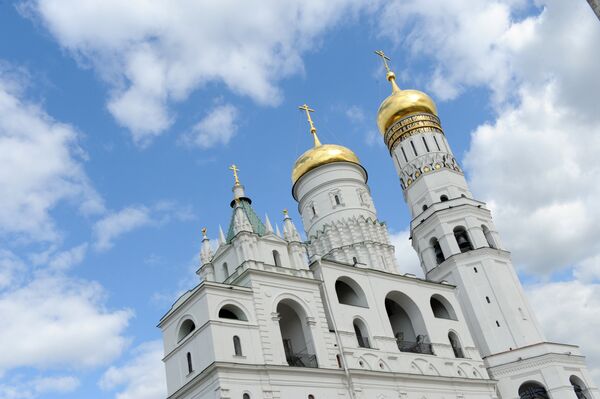MOSCOW, July 8 (RIA Novosti) – A Russian satellite TV channel devoted to Orthodox Christianity plans to go national to promote its conservative agenda, as part of a Kremlin push to counter the liberal opposition and bolster Russia’s traditional institutions, a Russian daily reported Monday.
Launched in 2005, Spas (Savior) TV has been endorsed by the increasingly powerful Russian Orthodox Church and claims to have an audience of about 10 million households in Russia. But the channel has widely been criticized for its unexciting programming and recycling of old shows.
Funded from donations from Orthodox businessmen, it features talk shows and educational programs that have often lambasted Darwinism and maintained that Russia is part of an “Orthodox civilization” that does not need such Western affectations as liberal democracy, feminism and gay marriage.
The channel has filed an application with Roskomnadzor, the government body that distributes television frequencies, to become part of a nationwide set of digital television channels, the Kommersant daily reported Monday. Spas TV will be reformatted technologically and thematically to attract a wider audience, the channel’s director general Boris Kostenko told the paper.
The channel will feature “daily shows with discussions aimed at young, thinking, soul-searching people,” Kostenko was quoted as saying.
Following massive opposition protests against Vladimir Putin’s return to the Kremlin for a third presidency last May, the Kremlin has introduced a string of laws aimed at controlling the Internet, introduced penalties for offending religious believers and increased the penalties for religious groups promoting “extremist” ideas.
The Russian Orthodox Church, which has described Putin as a “God-given” leader, has become one of the most ardent supporters of the government’s drive for control of the nation’s consciousness, with unswerving support for even the most unpopular government initiatives.
The Church was widely seen as a driving force behind the prosecution of the feminist Pussy Riot band whose unauthorized, anti-Putin “punk prayer” at Moscow’s Christ the Savior Cathedral last February. The stunt was followed by an internationally condemned trial that sentenced three band members to two years in jail. An Orthodox priest who condemned the trial was defrocked last August and fled Russia.
The decision to promote a television channel is an atypical departure for the Church, which has not traditionally embraced technological innovation. Last month, Moscow Patriarch Kirill said monks should avoid the “sinful and tempting” Internet.
An outspoken cleric said that the decision to promote Spas TV is not political and the new audience may help the channel overcome its "chronic" financial problems.
"This is a normal evolution of an electronic mass medium," Deacon Andrei Kuraev, a professor at the Orthodox Church's Spiritual Academy, told RIA Novosti. "Hopefully, it will help the channel get rid of its chronic financial starvation and come up with new content."
But a dissident cleric and former lawmaker said that the plans signify the church's failure to attract young Russians.
"This is a sign of the Church’s failure to influence modern youth that wants freedom of religion, freedom of choice – and freedom to the outstanding young women from Pussy Riot,” Father Gleb Yakunin told RIA Novosti.
The plans to reformat the programming are nothing but “pitiful attempts and wasted money,” he said. “Nothing good and kind will come out of it.”
The Church excommunicated Yakunin in 1997 after he headed a government commission that concluded that most top clerics, including late Patriarch Alexy II and his successor, Patriarch Kirill, were KGB informers.
Oppressed and purged by the officially atheist Soviet government, since the collapse of the Soviet Union in 1991 the Moscow Patriarchate has grown into the world’s largest Orthodox church and now claims to have three-quarters of Russia’s 142 million in its flock – along with millions in former Soviet states.
But independent polls show that only a fraction of Russians are regular church-goers and Bible-readers, while an overwhelming majority of self-described Orthodox believers are unfamiliar with the tenets of Christianity and ignore church rites such as confession and fasting.


